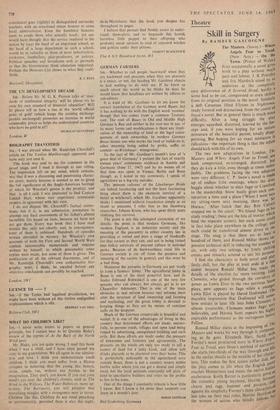GERMAN FARMERS SIR,—Whether to call people 'backward' when they are
backward and peasants when they are peasants is a smear, or not, the heading Mr. Gardiner objects to had nothing to do with me. If he knew as much about the world as he thinks he does he would know that headlines are written by editors or sub-editors.
It is kind ot Mr. Gardiner to let Inc know the correct translation of the German word Bauer. but
it has nothing to do with the English word 'yeoman'
though that too comes from a common Teutonic root. The root of Bauer in Old and Middle High German is Bau and neither in the root nor in any of
its many forms and modifications is there any impli- cation of the ownership of land or the legal conse-
quences of such ownership. In modern German Bauer means one who works the land or builds on it; other meaning being added by prefix, suffix or context—as Weinbauer: winegrower.
To the fact of Mr. Gardiner's month's tour of 'a great deal of Germany' I present the fact of exactly sixteen years' continuous residence in Austria and Germany (June 17, 1947) and by no means all of that time was spent in Vienna. Berlin and Bonn though, as I noted in my comments, I speak of agriculture as a big-city outsider.
The 'peasant cultures' of the Liineburger Heide are indeed fascinating and not the least fascinating
thing about them is the obstinate survival of a
belief in witchcraft, which Mr. Gardiner apparently thinks I mentioned without foundation simply as an
insult to peasants. I refer him to the Hamburg researcher, Johann Kruse, who has spent thirty years studying this survival.
The point is not this attempted correction of my details; the point is that modern Germany, like modern England, is an industrial society and the meaning of the peasantry in either country lies in providing as varied and pure a range of foodstuffs for that society as they can, and not in being turned into folksy survivals of peasant culture in national parks. Because of its backwardness rural life in German society is cut off from the purpose and meaning of the society in general. and this must be a bad thing.
Moreover the peasants in Germany are not 'ready to form a farmers' lobby.' The agricultural lobby in Bonn is one of the most powerful here, and its leader Edmund Rehwinkel is one of the very few persons who can always, but always, get in to see Chancellor Adenauer. That is one of the main obstacles to real reform because real reforms must alter the structure of land ownership and farming and marketing, and the green lobby is devoted to keeping things as they are by means of constant calls on the taxpayer.
Much of the German countryside is beautiful and varied. It is one of the advantages of living in this country that determined efforts are made, success- fully, to prevent roads, villages and open land being ruined by advertising, unregulated building and such evils. But these efforts are made under the pressure of townsmen and foresters and agronomists. The peasants on the whole are only too ready to sell a corner of land for a jazzy kiosk, and allow soft, drinks placards to be plastered over their barns. This is particularly noticeable in the agricultural area outside Bonn; there is not a country tavern within twelve miles where you can get a decent and simple meal, but the local peasants constantly sell plots of land to speculative builders and retire on the profits to live in the town.
One of the things I constantly relearn is how little I know. But 1 know a lot more than anybody can learn in a month's tour.
SARAH GAINHAM
Bad Codes berg, Germany


































 Previous page
Previous page